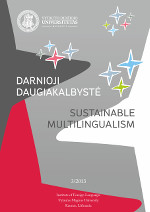Globalization and Language Policy within the EU: a Proposal for the South Tyrol
Globalization and Language Policy within the EU: a Proposal for the South Tyrol
Author(s): Alberto BerniniSubject(s): Language and Literature Studies
Published by: Vytauto Didžiojo Universitetas
Keywords: dialects; South Tyrol; language policy; linguistic minorities; local culture; European Union
Summary/Abstract: Nowadays we are witnessing the final spread of globalization, a process leading on the one hand to cultural exchanges, but on the other hand to the cultural leveling. Thus, the necessity emerges to strengthen the sense of belonging of the people to a well defined territory together with its culture, based, first of all, on the local language. Within Italian borders, we can find a particular situation characterized by the necessity to preserve the local identity and to maintain the cultural heritage, in a place where a great importance is given to the cultural roots (as testified, for example, by the phenomenon of the ‘Schützen’): the case of South Tyrol (an autonomous province in Northern Italy), which is part of Tyrol, a territory traditionally influenced by Germanic culture. By analyzing the linguistic situation in South Tyrol it became clear in which way Italy has faced the topic of linguistic minorities, by resorting to the principals of the nation-State. In South Tyrolean schools, German is taught as an official language, but South Tyrolean dialects, which belong to Austro-Bavarian languages, are mostly disregarded. One of the EU’s future challenges should be the will to preserve the territorial identities respecting in the meanwhile local traditions, especially through the conservation of the linguistic and cultural heritage developed over the centuries. A valid solution in regard to this situation could be the teaching of the local dialects at the side of German language; such a proposal could fit for other European situations, where a common and/or national language together with the local dialects could be taught, according to the founding principal of the EU: united in diversity.
Journal: Darnioji daugiakalbystė
- Issue Year: 2013
- Issue No: 3
- Page Range: 19-30
- Page Count: 12
- Language: English

